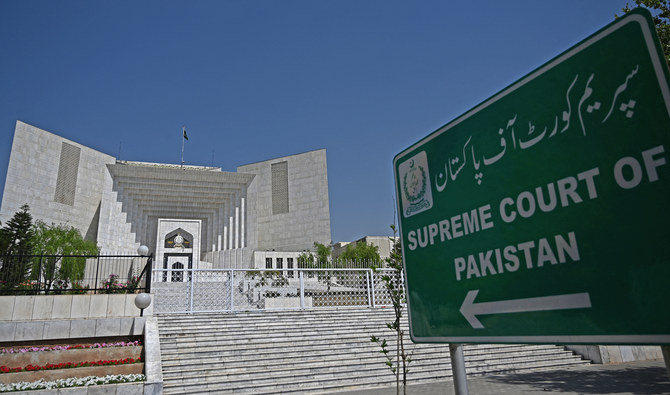ISLAMABAD: Pakistan's Supreme Court is meeting for the fourth time today, Thursday, to rule on the legality of political maneuvers that led Prime Minister Imran Khan to dissolve the national assembly last weekend and call for fresh elections.
Khan was due last Sunday to face a no-confidence vote tabled by the opposition in the National Assembly. But Qasim Suri, the deputy speaker of parliament, a member of Khan’s Pakistan Tehreek-e-Insaf party, threw out the motion, saying it was part of a foreign conspiracy and thus unconstitutional. He used Article 5 of the constitution, which deals with loyalty to the state, to make his case.
The president then dissolved the lower house of parliament on Khan’s advice.
The Supreme Court has since been hearing a case against the government moves filed by the opposition. The panel of five judges has not said when it will give a ruling but it could order parliament to be reconstituted, call for elections or bar Khan from power if he is found to have violated the constitution. The court could also decide that it cannot intervene in parliamentary affairs.
“The court doesn’t have authority to review the speaker’s ruling,” Lawyer Ali Zafar said at Wednesday’s hearing, adding that parliament could not comment on a case pending before the courts and the courts should likewise not interfere in parliamentary proceedings.
“Any direction from the parliament will be trespassing of the authority [of the court],” he said, adding that any direction to the speaker would mean giving direction to parliament.
The chief justice remarked that according to the petitioners, the court could review parliamentary proceedings in case there was a violation of the constitution.
“Your point is interesting that even if a ruling of the speaker is wrong, it enjoys a privilege,” he added, saying that what the speaker had done was “unprecedented” apart from the significance of Article 69, which says proceedings in parliament shall not be called in question on the ground of any irregularity of procedure.
“This will have many negative consequences if allowed to happen,” the chief justice said, adding that the no-confidence motion was about to be adopted on the day of voting when the deputy speaker gave his ruling that it was unconstitutional.
Zafar replied: “The court should leave the matter to the public instead of interfering [in parliamentary proceedings].”
The chief justice remarked that the judges would respect the sanctity of the parliament but the Supreme Court could interfere if there was a violation of the constitution.
Earlier, Pakistan Tehreek-e-Insaf (PTI) counsel Babar Awan raised legal points to justify the speaker’s ruling and the subsequent dissolution of the National Assembly, saying there was a foreign conspiracy to topple Khan.
“We want to know about the conspiracy before handing down judgment,” the chief justice said. “Apparently the deputy speaker’s ruling contains allegations instead of facts.”
The chief justice questioned if the deputy speaker could give such a ruling without revealing evidence and facts: “This is the constitutional point in which the court has to give its verdict.”
Bandial also asked Awan about the minutes of a March 31 National Security Committee’s meeting that reviewed a “blatant interference” in Pakistan’s domestic affairs by a foreign power.
Pakistan’s military, whose army, navy and air force chiefs were present at the NSC meeting, is facing growing calls by the opposition to clarify its position on the veracity of Khan’s complaints about a foreign conspiracy against him.
Khan has said the plot to dislodge him was being orchestrated by the United States, which the State Department and the White House have denied.
AFP adds: The court could decide that the National Assembly is responsible for its own rules and regulations, and the refusal of the deputy speaker to hold a vote is a matter for lawmakers to settle.
However, some legal analysts argue it is an issue for the court: according to the constitution, the prime minister cannot ask the president to dissolve the assembly if a no-confidence vote is pending.
Still, the court could decide the decision to refuse the vote effectively meant the matter was no longer pending, sending the issue back to the assembly, which would mean the dissolution likely stands.
In this case, the ruling would effectively nullify the subsequent decision to dissolve parliament, so lawmakers could be ordered to reconvene and Khan would almost certainly be booted out of office.
There is precedent, however.
In 1988, Muhammad Khan Junejo appealed to the court after the assembly was dissolved by then-president General Zia-ul-Haq, who had taken power in a military coup years earlier.
It agreed his government had been dissolved unconstitutionally, but ruled that since elections had been announced, it was best to move on.
No date has been set for elections in the current crisis, but a similar ruling could emerge.
Also, in 1993, the court ruled president Ghulam Ishaq Khan had illegally dissolved the assembly -- then with Nawaz Sharif as prime minister.
Although the government resumed business, it lasted less than two months before being dissolved again.
If the court rules nothing untoward happened, it seems likely all subsequent actions would also stand and Pakistan would go to polls within 90 days.
Pakistan Supreme Court meets for fourth time today to rule on political crisis
https://arab.news/89hkw
Pakistan Supreme Court meets for fourth time today to rule on political crisis
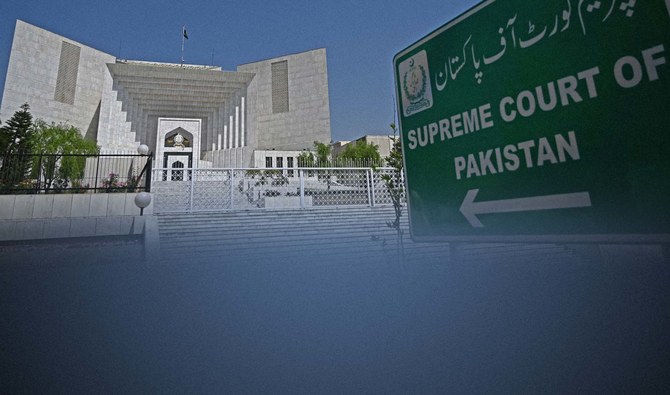
- Court could decide parliament responsible for its own rules, speaker's refusal to hold no-trust vote for lawmakers to settle
- Some legal analysts argue PM cannot ask president to dissolve assembly if a no-confidence vote pending
Gunmen kill a police officer assigned to protect polio workers in northwest Pakistan
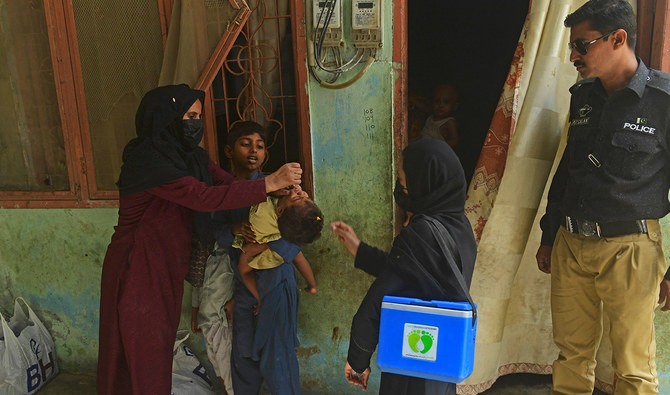
- At least 10 police have died this year while on security duty for vaccination campaigns in Khyber Pakhtunkhwa province
- Anti-polio campaigns in Pakistan are regularly marred by violence, with militants claiming campaigns sterilize children
PESHAWAR: Gunmen fatally shot a police officer assigned to protect polio workers in Pakistan’s northwest, an official said Tuesday.
At least 10 police have died this year while on security duty for vaccination campaigns in Khyber Pakhtunkhwa province.
The gunmen fired at a team working in Bajaur district, killing the officer on the spot, police officer Dilawar Khan said.
No one immediately claimed responsibility for the assault.
Anti-polio campaigns in Pakistan are regularly marred by violence. Militants target vaccination teams and police assigned to protect them, falsely claiming that the campaigns are a Western conspiracy to sterilize children.
A five-day anti-polio campaign started Monday in 13 high-risk districts of Khyber Pakhtunkhwa. More than 21,000 teams are tasked with administering vaccines to 4,423,000 children under age 5. More than 32,000 police are protecting the teams.
Pakistan and neighboring Afghanistan are the only countries where the spread of polio has never been stopped.
The potentially fatal, paralyzing disease mostly strikes children under age 5 and typically spreads through contaminated water.
Occupiers using ‘fake news’ against freedom struggles in Kashmir, Palestine — Pakistan’s UN envoy
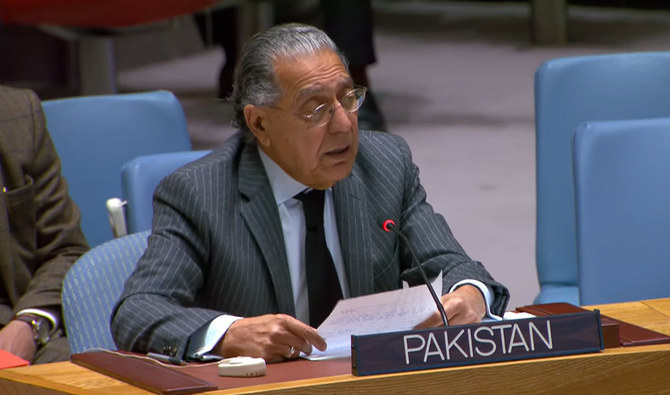
- Conflicts in Gaza and Ukraine have become key battlegrounds in an information war
- Online propaganda fighting to make people around the world take sides, harden positions
ISLAMABAD: Pakistan’s Permanent Representative to the United Nations, Ambassador Munir Akram, has said occupying powers were increasingly using fake news and disinformation campaigns to subdue freedom struggles in Kashmir and Palestine, state-run APP said on Tuesday.
The conflicts in Gaza and Ukraine have become key battlegrounds in an information war that goes far wider than their tightly drawn physical borders. Carefully crafted social media posts and other online propaganda are fighting to make people around the world take sides, harden their positions and even move broader public opinion.
While plenty of real imagery and accounts of the ensuing carnage have emerged, they have been intermingled with users pushing false claims and misrepresenting videos from other events.
“We are witnessing this today in the Gaza war and have witnessed this consistently in the case of occupied Jammu and Kashmir,” Akram told the UN Committee on Information on Monday, referring to online disinformation campaigns.
Akram voiced regret that the use of digital media was “turbocharging” the spread of disinformation “to promote Islamophobia to justify foreign occupation and aggression to turn victims of aggression into the culprits.”
This had led Pakistan to initiate a resolution on disinformation which was unanimously adopted last year, the Pakistani envoy said, adding that consultations would soon take place to advance its objectives.
“Pakistan would welcome the development of an inter-governmentally formulated code of conduct for information integrity on digital platforms,” Akram said, adding that the increasing use of AI tools to spread false information and conduct digital surveillance needed to be addressed.
“At the core of information manipulation, Internet blackouts, censorship and the use of special media laws by the occupation authorities is a sinister design to de-legitimize freedom struggles and perpetuate a climate of fear, intimidation and violence,” Akram added.
In some instances with regards to the Gaza war, online propaganda simply involves the framing of real events, violent images and videos, and hate speech to emphasize the guilt of one side and vindicate the other.
But much of the material relies on the creation of what’s commonly referred to as fake news, in the form of fabricated stories published on social media that repurpose or mislabel real photos or videos.
For example, one post on X (formerly Twitter) that was viewed 300,000 times used a photo of an accidental fire at a McDonald’s restaurant in New Zealand to falsely claim the company had been attacked by pro-Palestinian protesters for its perceived support of Israel. Despite being debunked, the story was still the focus of heated discussions on social media channels.
There are also reports of excerpts from video games and old TikToks being shared with claims they are from real current events in Gaza, and fake government agency social media accounts posting disinformation.
Pakistan unveils advanced anti-rape cell in Karachi to boost conviction rate in sexual violence cases
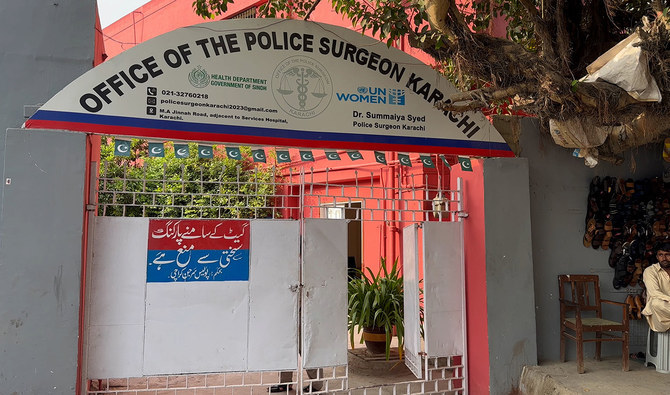
- The model cell is an improved version of a pilot project launched in the southern Pakistani city last year
- A medical legal department at the center of the new cell will work with the police, empower prosecution
KARACHI: Less than eight months after the inauguration of the pioneering Anti-Rape Crisis Cell in Pakistan’s southern Sindh province, authorities on Tuesday unveiled a model cell to address legal cases involving sexual- and gender-based violence.
According to War Against Rape, a non-profit organization, Pakistan witnessed 5,279 reported rape cases in 2021, with less than three percent resulting in convictions, highlighting the urgent need for such initiatives.
Dr. Summaiya Syed, Police Surgeon Karachi, said recent measures in the province, including the Sindh Sexual Violence Response Framework of 2021 and the launch of the pilot Anti-Rape Crisis Cell last year, had shown promising progress, taking the conviction rate in cases of sexual violence from five to 15 percent.
“It offers separate spaces which weren’t really available in the pilot project,” she said after the launch of the model cell at the Jinnah Postgraduate Medical Hospital in a ceremony attended by the provincial health minister, Dr. Azra Pehechu, as the chief guest.
“Now we have better a space, better organization, better referral pathways, better connections between those referral pathways and better availability of resources,” she added.
Dr. Syed said they had learned several things from the pilot project which were utilized while setting up the new establishment.
“We hope that here since now we have dedicated referral pathways, dedicated SOPs [standard operating procedures] will be followed,” she added. “I have better staff provisions over here. We hope to take that [conviction ratio] higher.”
Maliha Zia, Associate Director Legal Aid Society, said facilities like anti-rape cells generate proper and effective evidence in cases of rape which can be used during the prosecution stage.
She said the government of Sindh, along with the police and the judiciary, had been working extensively for the last three years on improving the state’s response to rape cases.
The initiatives taken by the provincial authorities, she added, included training of medical staff to understand the role that they need to play during the trial and the necessary changes they need to make while reporting these cases.
“All this work has culminated in the establishment of an anti-rape crisis cell which not only puts together the medical legal department at the center, a capacitated medical legal department, but connects it directly with the police and prosecution to make an effective case,” Zia continued, adding strong medical evidence and solitary statement of the survivor would result in conviction rates.
Pakistan top court seeks government response on alleged intelligence interference in judiciary
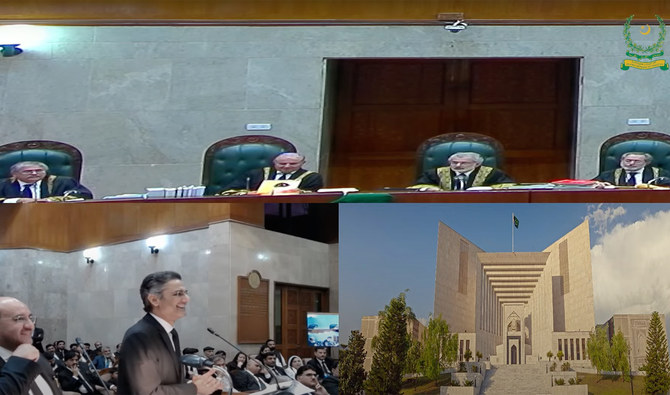
- The Supreme Court took up the case after six high court judges accused Pakistani spy agencies of intimidating them
- Chief Justice Qazi Faez Isa emphasizes he will not accept ‘any interference’ from any source in the judiciary’s affairs
ISLAMABAD: Pakistan’s top court on Tuesday sought replies from the government and bar associations in a case involving accusations levelled by six high court judges of intimidation and interference by the country’s intelligence agencies in judicial matters.
The Supreme Court of Pakistan took up the case after six out of eight Islamabad High Court (IHC) judges accused the Inter-Services Intelligence (ISI) agency of intimidating and coercing them over legal cases, particularly those with significant political consequences.
The judges provided various examples of alleged interference, including a case concerning Pakistan’s jailed former prime minister Imran Khan, and mentioned incidents where they said their relatives were abducted and tortured, and their homes were secretly surveilled, aiming to coerce them into delivering favorable judgments.
During the hearing on Tuesday, Chief Justice Qazi Faez Isa directed Attorney-General Mansoor Usman Awan to submit the federal government’s response in the case, ruling that if any intelligence agency or institution wanted to submit their response, they could do it until May 6.
“We all sitting in the court want to see judiciary independent,” he said. “Anyone in this court who doesn’t want judiciary’s independence [from external pressure], they can come forward.”
The development came after five high courts in the country, including the IHC, submitted their suggestions in the Supreme Court to prevent meddling of intelligence agencies in judicial affairs.
Chief Justice Isa also sought suggestions from the Pakistan Bar Council and the Supreme Court Bar Association before the next hearing.
“I will never accept any interference from any source and there has not been a single complaint since my assumption of this office to me or the SC’s registrar,” he said.
The letter by the IHC judges earlier stirred frantic debate in Pakistani political, media and legal circles that prompted Prime Minister Shehbaz Sharif to set up an inquiry commission late last month to investigate the accusations. But former chief justice Tassaduq Hussain Jillani, who was appointed head of the commission, recused himself, leading to uncertainty about the process.
Chief Justice Isa, who has repeatedly said that judicial meddling would not be tolerated, mentioned in Tuesday’s hearing that such interference could occur in multiple ways.
“Interference can be from within and without, from intelligence agencies, from one’s colleagues and family members or from social media,” he said.
The top judge maintained that judgments and court orders “shout” on their own if there was interference.
During the hearing, Justice Athar Minallah said there had been no interference during his time as a judge of the Islamabad High Court. He said this was a matter of public interest and a case involving the armed forces as they were the “defenders of the country.”
“We also have to maintain the image of our armed forces,” Justice Minallah remarked. “These are our soldiers who defend the country.”
The court ruled that no new petitioners would be made respondents in the case and adjourned the hearing till May 7.
Pakistani actress Mahira Khan bags ‘Artist in Fashion’ award at EMIGALA ceremony in Dubai

- EMIGALA awards in Dubai acknowledge creative and innovative impacts in the beauty and fashion industries
- With a string of successful projects in film and TV, Mahira Khan is considered Pakistan’s most successful actress
ISLAMABAD: Pakistani actress Mahira Khan bagged the “Artist in Fashion” award at the recently held prestigious EMIGALA awards in Dubai, where some of the world’s biggest names in fashion and beauty worldwide were honored.
Khan was in attendance at the award ceremony held at Festival Bay in Dubai on Apr. 27 and 28. The event featured an array of A-list attendees such as Brazilian-American beauty personality Camila Coelho, Lebanese-British fashion entrepreneur Karen Wazen, Dubai Bling star Loujain Adada, social media sensation Narins Beauty, Indian singer Arjit Singh and Khan, among others.
The EMIGALA awards acknowledge the creative and innovative impacts of global celebrities in the realms of beauty and fashion.
“The Artist in Fashion, Mahira Khan,” Emi Gala Awards wrote on Instagram with a picture of Khan posing with her trophy on Monday.
Khan is counted among Pakistan’s most prolific actresses, gaining widespread recognition for her work in her country’s entertainment industry. The Pakistani actress became a household name after a string of successful drama serials following which she forayed into movies and made her mark across the border in India.
She had her Bollywood debut opposite iconic actor Shah Rukh Khan in a crime action film, “Raees,” which was released in 2017. The Pakistani celebrity was also working on other Indian movie projects, though they could not take off when relations between the two countries deteriorated in 2016 after an Indian army brigade headquarters came under attack in Uri. The administration in New Delhi suspected Pakistan’s involvement which was denied by officials in Islamabad.
In 2021 Khan achieved another milestone when she debuted at the Cannes Film Festival, representing L’Oreal Paris Hair in her country. She has also represented various renowned local brands such as Elan, Zohra Rahman, and Menahel and Mehreen.


